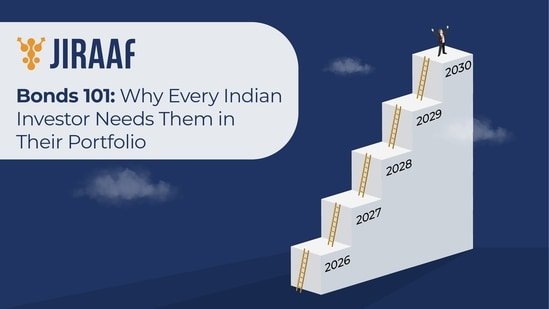How bond laddering can build predictable income for everyday Indians| Business News

In a world where interest rates swing, inflation fluctuates, and equity markets test patience, one investment strategy stands out for its calm and clarity: bond laddering. Once seen as a tool for institutions, it’s now quietly becoming a go-to approach for Indian investors seeking steady income and predictable returns.
Simply put, a bond ladder is a structured way of investing in multiple bonds with different maturities, say one, two, three, four, and five years. Instead of locking all your money into a single long-term bond, you spread investments across time, ensuring that part of your portfolio matures every year. This rhythm of maturity and reinvestment creates both liquidity and long-term consistency.
Why Laddering Works
Bond laddering effectively manages one of the biggest risks in fixed income: interest rate changes.
- When rates rise, shorter bonds mature and can be reinvested at higher yields.
- When rates fall, your longer-term bonds continue to earn the higher rates you locked in earlier.
In essence, you’re not trying to “time” the market. You’re letting your ladder balance itself automatically, giving you peace of mind and smoother returns.
“Laddering isn’t just a safety play, it’s a smart, self-balancing system for building predictable income,” says Saurav Ghosh, Co-founder of Jiraaf, a SEBI-registered Online Bond Platform Provider. The goal of OBPP platforms is to make strategies like laddering accessible for everyone, so that steady, structured returns aren’t reserved only for institutions.”
A 3-Step Guide: How to Start a Bond Ladder
Step 1: Define Your Cash Flow Needs
Decide how much liquidity you want every year. For instance, if you’d like part of your money to mature annually, plan bonds that mature at 1, 2, 3, 4, and 5 years.
Step 2: Select Quality Bonds Across Tenures
Choose a mix of government, PSU, and corporate bonds with varying ratings (AAA to BBB). Review issuer details, yields, and credit history through regulated digital bond platforms before making an investment.
Step 3: Reinvest Maturities to Extend the Ladder
When one bond matures, reinvest that amount into a new long-term bond. This keeps your ladder active, ensures continuous income, and helps you capture future interest rate movements.
Real-Life Use Cases: Who Can Benefit
Bond ladders aren’t just for the wealthy or financially savvy—they’re practical tools for anyone who values consistency.
- Retirees: A ladder can provide a steady cash flow to cover monthly expenses without depleting the principal. For example, a five-year ladder of investment-grade bonds (rated AAA to BBB) can generate predictable interest every year, and the maturing bonds replenish liquidity.
- Homemakers: For families managing household finances, laddering ensures annual access to funds for planned expenses like school fees or vacations, while the rest of the portfolio continues earning.
- Freelancers & Professionals: With irregular incomes, freelancers can rely on laddered bonds as a secondary, steady income stream to cover slow months.
A Sample Ladder
Imagine investing ₹10 lakh across five bonds. An investor could build a five-step ladder using a mix of:
Year |
Bond Type |
Expected Yield |
Allocation |
|---|---|---|---|
| Year 1 | Short-tenure Corporate and Government bonds | 8% to 12% | ₹2 lakh |
| Year 2 | A and BBB rated bonds | 12% to 15% | ₹2 lakh |
| Year 3 | AA and A rated Corporate Bond | 10% to 12% | ₹2 lakh |
| Year 4 | Corporate Bonds (AAA and AA rated) | 9% to 10% | ₹2 lakh |
| Year 5 | PSU and other AAA rated bonds | 7.5 to 9% | ₹2 lakh |
Each year, as one bond matures, you reinvest the proceeds into a new 5-year bond. Over time, this creates a rolling ladder, one that continually generates income and adapts to changing interest rates.
Built-In Diversification
Interestingly, a bond ladder naturally brings diversification — not by adding complexity, but through structure. Since the ladder spans multiple maturities, issuers, and credit ratings, your risk is automatically spread out. Even if one segment underperforms, the rest of the ladder cushions the impact.
That’s why experts see laddering as a bridge between traditional FDs and long-term investments. It offers safety, mutual fund-like flexibility, and institutional-grade strategy, all in one plan.
Why It’s the Right Time
With Indian bond markets expanding rapidly and online bond platforms simplifying access, retail investors can now adopt strategies that were previously limited to banks and insurers. In today’s environment, where interest rates may have peaked and inflation is easing, a well-structured bond ladder can lock in strong yields while keeping your portfolio nimble.
This is the perfect time for every Indian investor, whether they’re saving for retirement, family goals, or financial independence, to use laddering to turn predictability into prosperity.
Bottom Line
Bond laddering isn’t just a conservative approach; it’s a smart, strategic way to build steady wealth. By spreading investments across time and issuers, investors can enjoy regular income, stay flexible, and stay calm—no matter how markets move.
Note to the Reader: This article is part of Hindustan Times’ promotional consumer connect initiative and is independently created by the brand. Hindustan Times assumes no editorial responsibility for the content.





